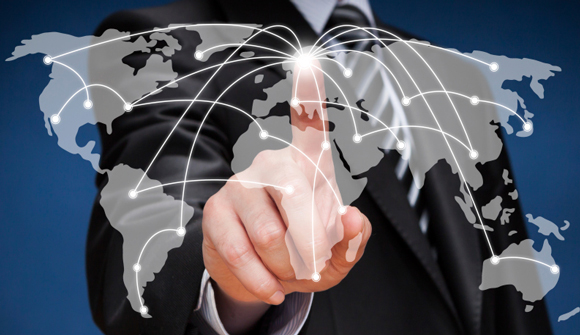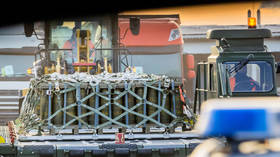New World Order: Empire of the Internet, One World Marketplace
by Joe Jarvis, The Daily Bell:
 Peace Through Mutual Benefit
Peace Through Mutual Benefit
In modern capitalist economies, foreign trade and investments have become all-important. Peace therefore brings unique dividends. As long as China and the USA are at peace, the Chinese can prosper by selling products to the USA, trading in Wall Street and receiving US investments.
Trade is the ultimate peacemaker. When two people–or peoples–benefit from one another, they only hurt themselves by hurting the other.
In Sapiens: a Brief History of Humankind, Yuval Noah Harari delves into how the world is integrating, and what this means for peace and prosperity.
Greed now leads to peace, where it once lead to war.
[W]hile the price of war soared, its profits declined. For most of history, polities could enrich themselves by looting or annexing enemy territories. Most wealth consisted of fields, cattle, slaves and gold, so it was easy to loot it or occupy it. Today, wealth consists mainly of human capital, technical know-how and complex socio-economic structures such as banks. Consequently it is difficult to carry it off or incorporate it into one’s territory.
42% of wealth is the rule of law. And you can’t plunder that.
International business on all scales creates a more peaceful planet. It isn’t just the multinational corporations which integrate the world. The ease with which individuals can now communicate, travel, live, and run small businesses abroad creates obstacles to war and conflict.
The internet was the main catalyst for this integration. It is this decentralized, voluntary, spontaneous network which is creating a new world order.
One World Marketplace
Over time, this feedback loop creates another obstacle to war, which may ultimately prove the most important of all. The tightening web of international connections erodes the independence of most countries, lessening the chance that any one of them might single-handedly let slip the dogs of war. Most countries no longer engage in full-scale war for the simple reason that they are no longer independent. Though citizens in Israel, Italy, Mexico or Thailand may harbour illusions of independence, the fact is that their governments cannot conduct independent economic or foreign policies, and they are certainly incapable of initiating and conducting full-scale war on their own…
[W]e are witnessing the formation of a global empire. Like previous empires, this one, too, enforces peace within its borders. And since its borders cover the entire globe, the World Empire effectively enforces world peace.
This sounds scary if you think the global empire is a government. But the true global empire is the interconnectedness which makes violence unprofitable.
Think about it. The more connected the world becomes economically, the more we all share the same interests. It isn’t the United Nations or European Union keeping war at bay. It is the fact that people have homes in the UK and Italy. It is the fact that businesses operate across continents, in various markets.
We can share video, organize people, and broadcast ideas and warnings easier than ever. That is why people are so effectively questioning the events in Syria–we have access to information. It flows easily.
But even as recently as 9/11/2001, this was not the case. The news was still curated for us by large companies who fell under the control of large governments. Much less could be effectively questioned, and the mainstream narrative easily prevailed.
Now, individuals and “unapproved” groups can share and discuss what is truly going on. Individuals can participate instead of just spectating.
The new world order is one of individual action and grassroots organization. The internet has helped to decentralize this power. And this globally interconnected marketplace can take the role that governments once played in keeping the peace within their borders.



